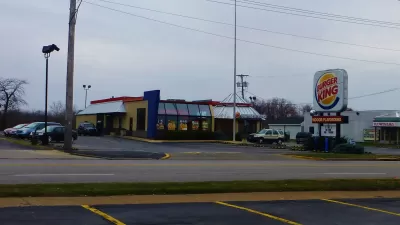Though cities like Los Angeles have established moratoriums on the construction of new fast food residents in an effort to tackle obesity, a new study questions the importance of place-based causes and solutions.
"In a new study, researchers from the University of North Carolina led by nutrition professor Barry Popkin have found that even when they are not eating at fast-food restaurants, children who frequent them tend to eat food that would probably make many of them overweight or obese anyway," reports Melissa Healy. "The authors of the latest research combed through a national database of Americans' health and nutrition behaviors and grouped 4,466 American kids--from ages 2 to 18--according to what they ate when they were not eating food purchased at a fast-food restaurant."
"'Our findings suggest that the location where foods are obtained may not be as important as the nutritional quality of the foods consumed,' the authors wrote. They also suggest that 'the effect of public health efforts targeted at fast food restaurants may also be overestimated, such that these efforts may be necessary but not sufficient to reduce child obesity if the remainder of the diet is not addressed.'"
FULL STORY: Fast food isn't making our kids fat. It's the rest of their diet.

Maui's Vacation Rental Debate Turns Ugly
Verbal attacks, misinformation campaigns and fistfights plague a high-stakes debate to convert thousands of vacation rentals into long-term housing.

Planetizen Federal Action Tracker
A weekly monitor of how Trump’s orders and actions are impacting planners and planning in America.

San Francisco Suspends Traffic Calming Amidst Record Deaths
Citing “a challenging fiscal landscape,” the city will cease the program on the heels of 42 traffic deaths, including 24 pedestrians.

Defunct Pittsburgh Power Plant to Become Residential Tower
A decommissioned steam heat plant will be redeveloped into almost 100 affordable housing units.

Trump Prompts Restructuring of Transportation Research Board in “Unprecedented Overreach”
The TRB has eliminated more than half of its committees including those focused on climate, equity, and cities.

Amtrak Rolls Out New Orleans to Alabama “Mardi Gras” Train
The new service will operate morning and evening departures between Mobile and New Orleans.
Urban Design for Planners 1: Software Tools
This six-course series explores essential urban design concepts using open source software and equips planners with the tools they need to participate fully in the urban design process.
Planning for Universal Design
Learn the tools for implementing Universal Design in planning regulations.
Heyer Gruel & Associates PA
JM Goldson LLC
Custer County Colorado
City of Camden Redevelopment Agency
City of Astoria
Transportation Research & Education Center (TREC) at Portland State University
Jefferson Parish Government
Camden Redevelopment Agency
City of Claremont



























